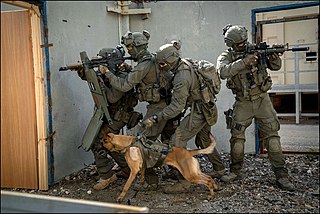Related Research Articles

Terrorism is, in the broadest sense, the use of intentional violence to achieve political aims. It is used in this regard primarily to refer to violence during peacetime or in the context of war against non-combatants. The terms "terrorist" and "terrorism" originated during the French Revolution of the late 18th century but became widely used internationally and gained worldwide attention in the 1970s during the conflicts of Northern Ireland, the Basque Country, and the Israeli–Palestinian conflict. The increased use of suicide attacks from the 1980s onwards was typified by the September 11 attacks in New York City and Washington, D.C. in 2001.

Counter-terrorism, also known as anti-terrorism, incorporates the practice, military tactics, techniques, and strategy that government, military, law enforcement, business, and intelligence agencies use to combat or prevent terrorism. Counter-terrorism strategy is a government's plan to use the instruments of national power to neutralize terrorists, their organizations, and their networks in order to render them incapable of using violence to instill fear and to coerce the government or its citizens to react in accordance with the terrorists' goals.
Religious terrorism is a type of religious violence where terrorism is used as a tactic to achieve religious goals or which are influenced by religious identity.

Islamic terrorism, Islamist terrorism or radical Islamic terrorism are terrorist acts against civilians committed by violent Islamists who have a religious motivation.

Lashkar-e-Taiba is an Islamist jihadist organization in Pakistan. It was founded in 1987 by Hafiz Saeed, Abdullah Azzam and Zafar Iqbal with funding from Osama bin Laden.
A lone actor, lone-actor terrorist, or lone wolf is someone who prepares and commits violent acts alone, outside of any command structure and without material assistance from any group. They may be influenced or motivated by the ideology and beliefs of an external group and may act in support of such a group. In its original sense, a "lone wolf" is an animal or person that generally lives or spends time alone instead of with a group.
Cyberterrorism is the use of the Internet to conduct violent acts that result in, or threaten, loss of life or significant bodily harm, in order to achieve political or ideological gains through threat or intimidation. It is also sometimes considered an act of Internet terrorism where terrorist activities, including acts of deliberate, large-scale disruption of computer networks, especially of personal computers attached to the Internet by means of tools such as computer viruses, computer worms, phishing, and other malicious software and hardware methods and programming scripts. Cyberterrorism is a controversial term. Some authors opt for a very narrow definition, relating to deployment by known terrorist organizations of disruption attacks against information systems for the primary purpose of creating alarm, panic, or physical disruption. Other authors prefer a broader definition, which includes cybercrime. Participating in a cyberattack affects the terror threat perception, even if it isn't done with a violent approach. By some definitions, it might be difficult to distinguish which instances of online activities are cyberterrorism or cybercrime.
Justice Commandos of the Armenian Genocide (JCAG) was an Armenian militant organization active from 1975 to 1987.
Terrorism in Pakistan according to Ministry of Interior, poses a significant threat to the people of Pakistan. The current wave of terrorism is believed to have started in 2000 and peaked during 2009. Since then it has drastically declined as result of military operations conducted by the Pakistan Army. According to South Asian Terrorism Portal Index (SATP), terrorism in Pakistan has declined by 89% in 2017 since 2009.
Jamaat-ul-Mujahideen is an Islamic terrorist organisation operating in Bangladesh. It is also listed as a terror group by the UK. It was founded in April 1998 in Palampur in Dhaka division by Abdur Rahman and gained public prominence in 2001 when bombs and documents detailing the activities of the organisation were discovered in Parbatipur in Dinajpur district. The organisation was officially declared a terrorist organisation and banned by the government of Bangladesh in February 2005 after attacks on NGOs. But it struck back in mid-August when it detonated 500 small bombs at 300 locations throughout Bangladesh. The group re-organised and has committed several public murders in 2016 in northern Bangladesh as part of a wave of attacks on secularists.
Popular Front for Armed Resistance, or PFAR, is a terrorist outfit formed during the 1960s. The group is responsible for series of bomb blasts in Pakistan. PFAR aim was independence of Baloch region from Pakistan. There has been no accurate independent estimate of the size or strength of PFAR. Most of outfit's activists were trained in Afghanistan. For the outfit, Afghanistan was good place to obtain weaponry and others goods.
The 2002 Qasim Nagar massacre was the killing of 29 Hindu labourers in Qasim Nagar on the outskirts of Jammu (city) in Jammu and Kashmir by Kashmiri militants on 13 July 2002.
The Jaipur bombings were a series of nine synchronized bomb blasts that took place on 13 May 2008 within a span of fifteen minutes at locations in Jaipur, the capital city of the Indian state of Rajasthan, and a tourist destination. Official reports confirm 63 dead with 216 or more people injured. The bombings shocked most of India and resulted in widespread condemnation from leaders across the world with many countries showing solidarity with India in its fight against terrorism.

A suicide attack is any violent attack in which attackers accept their own death as a direct result of the attacking method used. Suicide attacks have occurred throughout history, often as part of a military campaign, and more recently as part of terrorist campaigns.

The All Tripura Tiger Force (ATTF) is a Tripuri nationalist insurgent group active in India's Tripura State. It was founded on 11 July 1990, by a group of former Tripura National Volunteer members under the leadership of Ranjit Debbarma. The ATTF is considered a terrorist organisation by India. According to the South Asian Terrorism Portal, approximately 90% of the ATTF's administration are Hindu and the rest are Christians. The group is said to have been formed as the armed wing of the National Liberation Front of Tripura (NLFT) but since seems to have split into its own organization. The group is headquartered in Tarabon in Bangladesh.
Pakistan and state-sponsored terrorism refers to the involvement of Pakistan in terrorism through the backing of various designated terrorist organizations. Pakistan has been frequently accused by various countries, including its neighbours Afghanistan, India, and Iran, as well as by the United States, the United Kingdom, Germany, and France, of involvement in a variety of terrorist activities in both its local region of South Asia and beyond. Pakistan's northwestern tribal regions along the Afghanistan–Pakistan border have been described as an effective safe haven for terrorists by Western media and the United States Secretary of Defense, while India has accused Pakistan of perpetuating the insurgency in Jammu and Kashmir by providing financial support and armaments to militant groups, as well as by sending state-trained terrorists across the Line of Control and de jure India–Pakistan border to launch attacks in Indian-administered Kashmir and India proper, respectively. According to an analysis published by the Saban Center for Middle East Policy at the Brookings Institution in 2008, Pakistan was reportedly, "with the possible exception of Iran, perhaps the world's most active sponsor of terrorist groups... aiding these groups that pose a direct threat to the United States. Pakistan's active participation has caused thousands of deaths in the region; all these years Pakistan has been supportive to several terrorist groups despite several stern warnings from the international community." Daniel Byman, a professor and senior analyst of terrorism and security at the Center For Middle East Policy, also wrote that, "Pakistan is probably 2008's most active sponsor of terrorism". In 2018, the former Prime Minister of Pakistan, Nawaz Sharif, suggested that the Pakistani government played a role in the 2008 Mumbai attacks that were carried out by Lashkar-e-Taiba, a Pakistan-based Islamist terrorist group. In July 2019, Pakistani Prime Minister Imran Khan, on an official visit to the United States, acknowledged the presence of some 30,000–40,000 armed terrorists operating on Pakistani soil. He further stated that previous administrations were hiding this truth, particularly from the United States, for the last 15 years during the War on Terror.

There is a long history of terrorism in Europe. This has often been linked to nationalist and separatist movements, while other acts have been related to politics, religious extremism, or organized crime. Terrorism in the European sections of the intercontinental countries of Turkey and Russia are not included in this list.
The Pattani Islamic Mujahideen Movement is an Islamic insurgent movement that has carried out violent actions as part of the protracted insurgency in Southern Thailand.